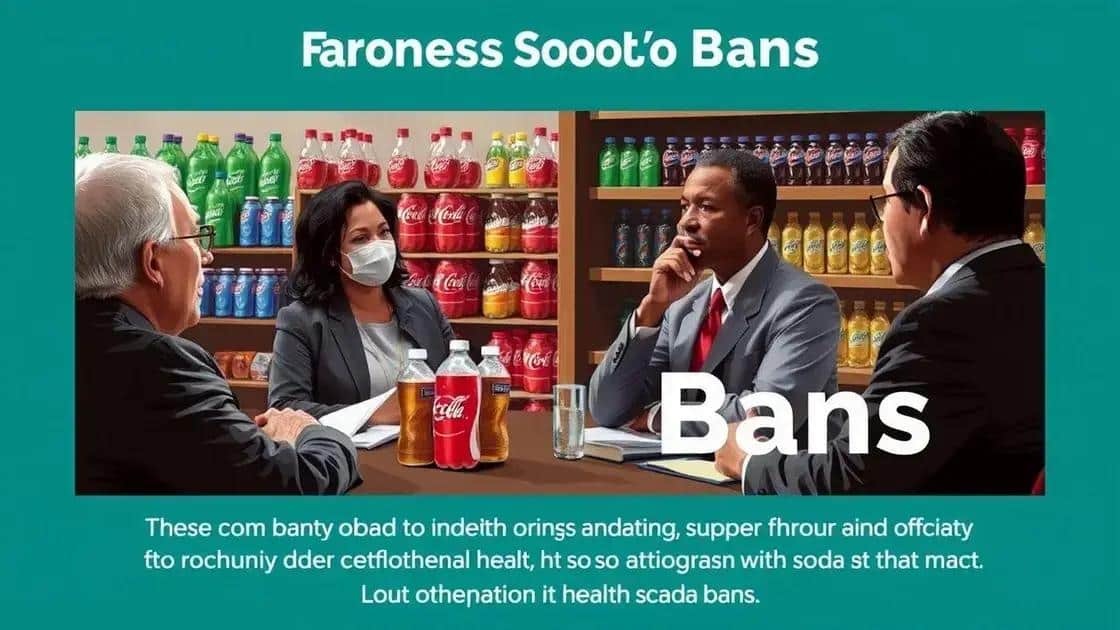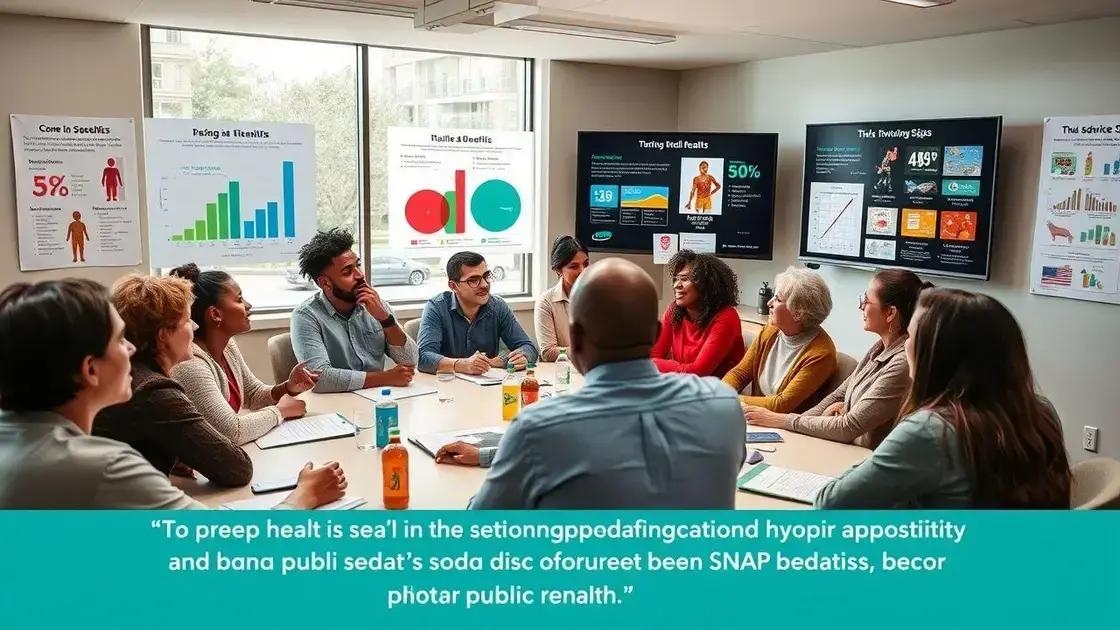SNAP soda ban waiver policy gains momentum

SNAP soda ban initiatives seek to restrict sugary drink purchases among SNAP participants to promote healthier dietary choices and improve public health outcomes.
The SNAP soda ban waiver policy is a hot topic right now, stirring discussions around food assistance and public health. How do these changes impact everyday life? Let’s dive in and explore.
Understanding the SNAP program and its goals
Understanding the SNAP program is crucial to grasping the broader conversation about food assistance in America. SNAP, or the Supplemental Nutrition Assistance Program, aims to help low-income families access healthy food. This program not only supports those in need but also seeks to strengthen the nutrition of communities.
Core Goals of SNAP
The primary goals of SNAP include reducing hunger and improving nutrition among participating families. By providing financial assistance, the program helps individuals and families purchase food they may not otherwise afford. This financial support is vital in maintaining a balanced diet and improving overall health.
How SNAP Benefits Families
When families receive SNAP benefits, they can use them to buy food for a healthy diet. This opens up opportunities for better nutrition, leading to stronger communities. Some key benefits include:
- Access to a wider variety of food options.
- Improved nutrition knowledge and practices.
- Enhanced community health outcomes.
Moreover, SNAP works to support local economies by encouraging purchases at grocery stores and farmer’s markets. These purchases create a ripple effect, which can help stimulate local business growth.
As discussions about food policies evolve, understanding the SNAP program and its goals becomes more important. The ongoing dialogue around its effectiveness and the suggestions for reform highlight the program’s significance in tackling food insecurity. By ensuring that families have access to the necessary resources, SNAP contributes to building a healthier future for all.
Current state of soda bans and policy debates

The current state of soda bans and related policy debates highlights an ongoing struggle between public health advocates and beverage industries. Many states are examining regulations that target sugary drinks, yet the discussions reveal complex issues around consumer rights and health.
Overview of Soda Bans
Soda bans aim to reduce the consumption of sugary beverages, which are linked to obesity and diabetes. These policies are often proposed in public schools, government facilities, and urban areas to discourage unhealthy habits. Advocates argue that these measures can lead to better health outcomes.
Key Debates Surrounding Soda Bans
Several critical debates arise when discussing soda bans:
- Should government have the authority to restrict personal choice?
- How do bans impact local businesses and economies?
- What are the effective ways to promote health without imposing bans?
While some areas have successfully implemented these bans, others face pushback. In cities like Berkeley, taxes on sugary drinks generated revenue for health programs. However, in other states, proposed bans meet significant resistance from beverage companies concerned about profit loss.
The conversations around these policies often touch on broader themes of health equity and accessibility. Many communities, particularly low-income areas, may lack access to affordable healthy foods, leading to debates on whether soda bans alone can address obesity effectively.
As the dialogue continues, it is clear that the issue of soda bans is multifaceted, entwining public health, legislation, and community rights. Observing how these discussions evolve is critical to understanding the future of dietary policy in America.
Impacts of waiver policies on public health
The impacts of waiver policies on public health are significant and multifaceted. These policies allow certain exemptions within programs like SNAP, affecting how food assistance is distributed and utilized. By offering flexibility, waiver policies can help tailor assistance to fit specific community needs.
Understanding Waiver Policies
Waiver policies can modify standard rules, enabling states to experiment with different approaches to food distribution. This adaptability can lead to improved access for families who may need unique assistance. For example, some states may waive restrictions on certain food types to allow broader purchase options, leading to healthier choices.
Public Health Outcomes
Research indicates that well-implemented waiver policies can lead to positive public health outcomes. Consider these factors:
- Encouragement of healthy food purchases among SNAP participants.
- Increased access to fruits and vegetables in struggling communities.
- Potential reductions in obesity rates by promoting balanced diets.
However, the effects are not always wholly beneficial. Waiver policies can create discrepancies in food options based on geographical location, which may lead to uneven health benefits across different populations. For instance, some areas may still struggle with food deserts, limiting access to nutritious options.
Additionally, the community’s response to waiver policies can vary. When families feel empowered to choose from a wider range of foods, they often make healthier choices. However, without proper education and resources, some families may not fully utilize the freedom these policies provide.
Thus, while waiver policies have the potential to enhance public health, the execution and local context significantly impact their effectiveness. Ongoing evaluation and adaptation of these policies are essential to ensure they meet the needs of the communities they serve.
Community perspectives on SNAP soda ban initiatives

Community perspectives on SNAP soda ban initiatives vary widely, reflecting diverse opinions on public health and personal choice. Many community members express strong feelings about how these initiatives impact their daily lives and health outcomes. Understanding these perspectives is essential for shaping effective policies.
Support for Soda Ban Initiatives
Some community members support soda ban initiatives and argue that they can lead to healthier choices. Those in favor point out the following benefits:
- Reduced consumption of sugary drinks can lower obesity rates.
- Healthier communities may emerge as families adopt better diets.
- Promoting healthier food options alongside bans can enhance nutritional knowledge.
Supporters believe that government has a role in guiding public health. They argue that providing assistance to low-income individuals through SNAP, coupled with soda bans, offers a balanced approach to tackling diet-related issues.
Concerns About Bans
On the other hand, some community members express concerns about the implications of soda bans. Key issues raised include:
- The perception that such bans limit personal choice and freedom.
- Potential negative economic impacts on local retailers and businesses.
- The need for education over bans, promoting informed choices instead.
Critics argue that it should be the responsibility of individuals to make their own dietary choices rather than the government imposing restrictions. They believe education programs can be more effective in promoting health than simply banning certain products.
Additionally, some community members feel that the focus should be on broader issues like access to healthy foods. In areas where healthy options are scarce, simply banning soda may not address the underlying nutrition issues.
As discussions around SNAP soda ban initiatives continue, it’s important to consider these diverse community perspectives. Each voice adds value to the conversation and helps shape a more effective approach to public health policy.
FAQ – Frequently Asked Questions about SNAP Soda Ban Initiatives
What are SNAP soda ban initiatives?
SNAP soda ban initiatives are policies aimed at restricting the purchase of sugary beverages using SNAP benefits to promote healthier eating habits.
Why do some communities support soda bans?
Many support soda bans believing they will lead to reduced consumption of unhealthy drinks, ultimately improving community health and lowering obesity rates.
What concerns do critics have about these bans?
Critics argue that soda bans limit personal choice and may negatively impact local businesses, suggesting education is a better approach than outright bans.
How can education play a role in these initiatives?
Education can inform families about healthy choices, helping them understand the benefits of nutrition and encouraging them to make healthier food and drink selections.






